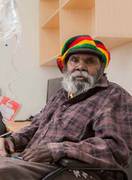Research key to unlocking early signs of chronic kidney disease

The WA Country Health Service (WACHS) is leading ground-breaking research which could ease the burden of chronic kidney disease (CKD) on patients and health services.
As part of the Digital Health Cooperative Research Centre, WACHS is collaborating with Curtin University, the WA Department of Health and WA Primary Health Alliance, using health data analytics to better identify and manage CKD across country WA.
Curtin University PhD student David Lim will join WACHS, tasked with analysing the data as part of his doctorate in Public Health.
David says the WACHS partnership is crucial to the project. CKD is a significant problem in rural and remote areas where hospitalisation rates are about twice as high as in the cities and Aboriginal Australians four times more at risk.
“I will be looking at how we can use data analytics to identify people who show early indications of chronic kidney disease,” explained David.
“It’s a really serious disease, which affects about one in ten Australian adults and nearly 90 per cent of cases are not diagnosed in the early stages.
“We really need to develop tools to identify those people who have chronic kidney disease and get some early interventions happening.”
A condition characterised by the gradual loss of kidney function, CKD is often referred to as a silent killer because up to 90 per cent of kidney function lost before symptoms are evident.
CKD cannot be cured but through timely and appropriate care, progression can be slowed or halted, stopping the need for end-stage invasive treatment.
Although 1.7 million Australian adults are estimated to have chronic kidney disease, less than 10 per cent are aware they have the condition.
Research into disease progression is critical so we can provide patients with the best access to early diagnosis and management to give them the best outcomes.
The partnership will see leading researchers use data linkage and machine learning to mine existing health records and provide new insights into the risk factors associated with CKD, identifying any gaps in the system.
Data analysed from blood test results, along with information recorded when a patient enters hospital, will help paint a picture of the patient journey from the first signs of poor kidney function, even before symptoms appear.
WACHS Renal Program Manager Lois Johnston says the health service has many competitive advantages in conducting research, including robust governance, a unique patient population, a highly skilled clinical workforce and an innovative mindset.
“Research is vital if we are to enhance the wellbeing of patients in rural, regional and remote areas,” Lois said.
“A key objective of this partnership is early diagnosis, intervention and management which has the potential to improve the health outcomes for people with kidney disease.”
The jointly-funded initiative will run for four years from 2020-2024.

